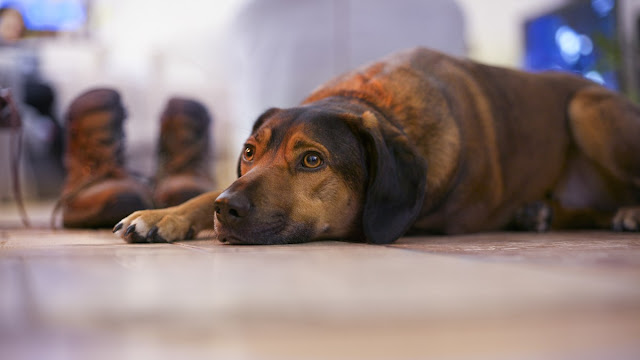Unfortunately I've seen more and more cases of separation anxiety in the dog's behavior lately. Is that because we all live so fast that we leave our dogs more often? The fact is that dealing with a dog suffering from separation anxiety can be one of the most painful experiences a dog owner can make.
Here's the thing: your dog is not just behaving badly. He literally suffers from separation anxiety in the dog's behavior. Why is it so?
As a social animal, dogs must have a human companion or be part of a larger group of dogs. Being alone is almost unnatural. When a dog is alone, he chews, moans, barks, digs, does his job to relieve himself. Part of the problem is that your dog can only react in this way when you are away from home.
Is there a way to handle separation anxiety in dog behavior? Luckily yes!
The conclusion for dealing with this disease is the training. Just as a dog is trained to poop and urinate in the right place, or look for it, he may be trained to get used to being alone.
This is a step-by-step approach to dealing with separation anxiety in a dog's behavior:
1. Do not do much to go
Do not say goodbye when you leave (eg, pay particular attention to it before you leave). This will only increase the trauma of being alone. Try to treat your dog shortly before leaving and go quietly.
So when you get home, do it comfortably. This shows your dog that your whereabouts are neither good nor bad.
2. Keep your dog busy
Another important step is to keep your dog occupied while you are away. Let him have his favorite toy with a treat.
3. Use good dog training practices
Make sure you comply with the Dogs Code of Conduct. Above all, do not spoil it and do not pay too much attention to your dog. Encourage your dog to play alone whenever possible, and congratulate him accordingly.
4. Train your dog to relieve stress
Be sure to train your dog regularly. As with humans, exercise helps reduce stress in dogs. Your dog's regular exercise also helps keep it healthy, balanced and strong.
5. Do not punish your dog
Whatever you do, do not punish your dog for his bad behavior. Remember that separation anxiety in the dog's behavior is not something your dog deliberately points out.
6. Do not ignore the problem
If you are working with a dog suffering from this disease, do not ignore the problem and wait until it disappears. Start training now.
7. Consult a veterinarian
If all else fails, consult the veterinarian. Although the above advice is good general advice, do not forget to consult with experts when needed. In some cases, medical assistance is required.
To summarize, treating separation anxiety in a dog's behavior requires the following steps:
- Do not stop
- Take care of your dog
- Use good training methods
- Train your dog to relieve stress
- Do not punish your dog
- Do not ignore the problem
- Consult a veterinarian
If you are like me it is very painful to have separation anxiety in dog behavior with my dogs. Do not let your dog suffer. Put the previous steps into practice as soon as possible. Your dog will thank you for many years.
Concern for the separation of the dog is a major problem that usually goes unnoticed by most dog owners. I hope to highlight the problem for you here and to give you some indications that you should keep in mind. My goal is ideally to prevent anxiety in dogs or at least to show you how to treat them effectively.
Separation anxiety can come from anything that has happened in a dog's life since childhood, but usually it's the connection they make with their owner. If the dog becomes too dependent or depends on the separation of his dog, a fear can develop.
About 10% of all puppies and older dogs suffer from separation anxiety and are usually the leading cause of dogs landing in niches. Unfortunately, there is no quick fix for this disorder and it is very difficult and requires a lot of time to solve this problem in your dog.
Visit my blog, where you'll find this lesson on separation anxiety in dogs. You'll see some examples of things you can do today, right now, to teach this potentially life-saving skill to your dog.
References:
https://getfreedogtraining.com/how-to-deal-with-separation-anxiety-in-your-dog/
https://www.freedogtrainingclasses.com/separation-anxiety-issue-in-dogs/



No comments:
Post a Comment